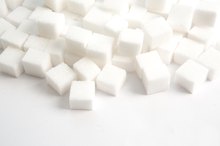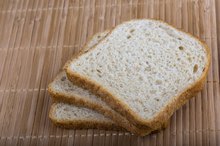What Are Health Benefits of Vegetable Cellulose?
Cellulose is a kind of fiber, and although it's an important component of a diet, you can't digest it, and it contains no calories. However, cellulose helps maintain normal digestive function, and also slows your digestive processes, which in turn helps you maintain a more stable blood sugar level and, indirectly, a healthy weight.
Cellulose
Cellulose is a large molecule made up of a long chain of monosaccharides, or single sugar units, called glucose. Glucose is actually a kind of sugar, but cellulose doesn't taste sweet because glucose molecules bound together in long chains can't bind to the sweetness receptor in the human mouth. Cellulose actually has a similar structure to that of starch, which is also made up of long chains of glucose, explain Drs. Reginald Garrett and Charles Grisham in their book "Biochemistry. 1"
- Cellulose is a large molecule made up of a long chain of monosaccharides, or single sugar units, called glucose.
- Cellulose actually has a similar structure to that of starch, which is also made up of long chains of glucose, explain Drs.
Uses
Pectin Vs. Agar
Learn More
Even though the structures of cellulose and starch are very similar, you can digest starch, but not cellulose, because humans don't produce the enzyme necessary for cellulose digestion -- though many species of bacteria do. When you consume cellulose, it passes through your stomach and small intestine unscathed, and is eventually broken down by bacteria in the large intestine. They produce gases as a byproduct of cellulose digestion, which is why high-fiber foods can sometimes cause bloating.
Digestive Health
Even though you can't digest cellulose, it has important benefits for your digestive tract. For instance, cellulose adds bulk to the material passing through the tract. This helps your intestine move food along more efficiently. You can think about this in terms of trying to squeeze a ball through a sock; it's easier to do with a large ball than a small one. A diet high in cellulose from vegetables and other sources promotes regularity.
- Even though you can't digest cellulose, it has important benefits for your digestive tract.
- This helps your intestine move food along more efficiently.
Other Benefits
Sucrose, Dextrose & Maltodextrin
Learn More
Indirectly, eating plenty of cellulose from vegetables and other sources -- including whole grains -- can help you maintain a healthy weight because fiber slows digestion, explains Dr. Lauralee Sherwood in her book "Human Physiology." This helps keep blood sugar levels more regular, which can prevent metabolic disorders 2. Also, you feel full longer, which can help prevent you from eating more calories than you need at any one time.
Related Articles
References
- “Biochemistry”; Reginald Garrett and Charles Grisham; 2007
- “Human Physiology”; Lauralee Sherwood; 2004
Writer Bio
Kirstin Hendrickson is a writer, teacher, coach, athlete and author of the textbook "Chemistry In The World." She's been teaching and writing about health, wellness and nutrition for more than 10 years. She has a Bachelor of Science in zoology, a Bachelor of Science in psychology, a Master of Science in chemistry and a doctoral degree in bioorganic chemistry.








